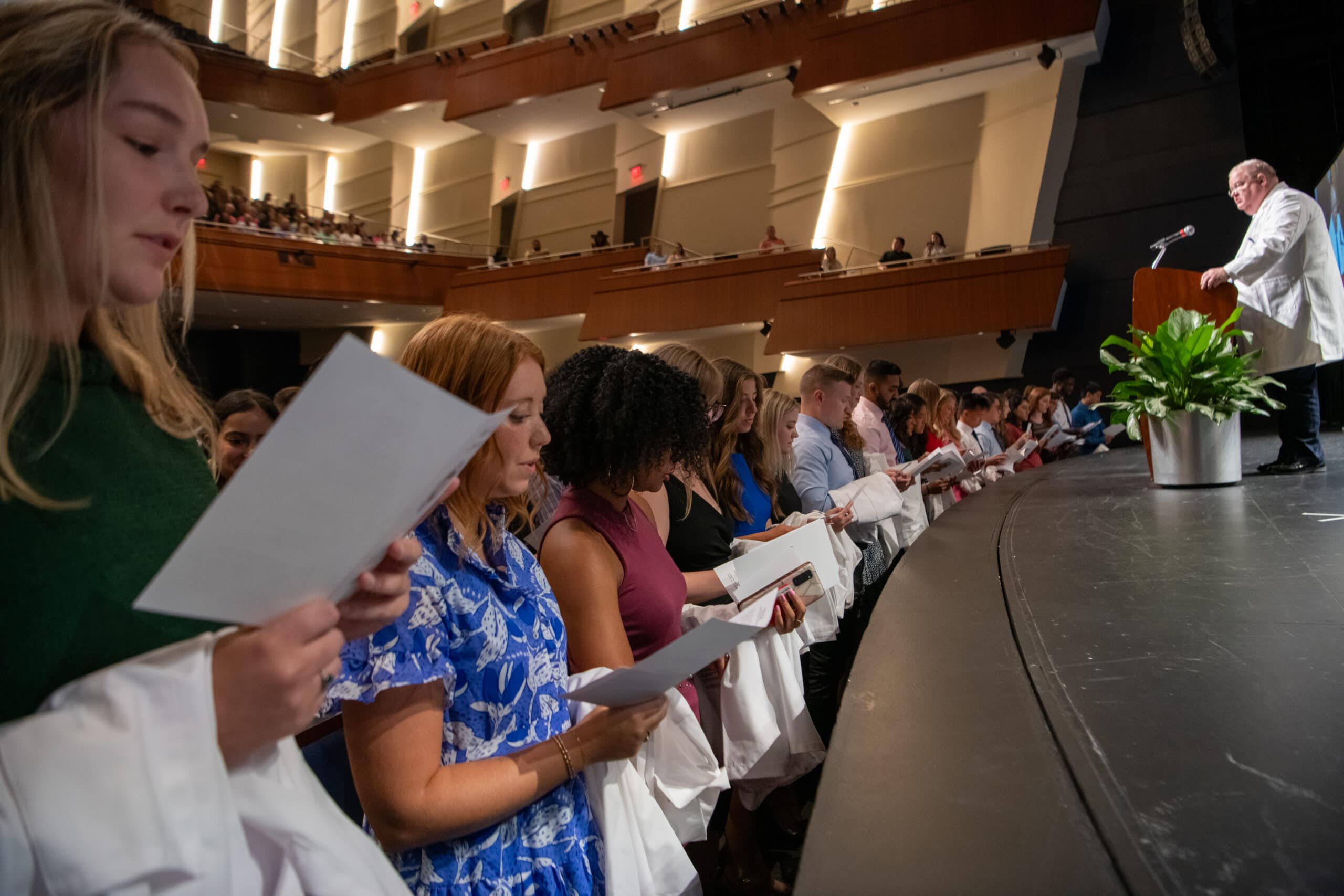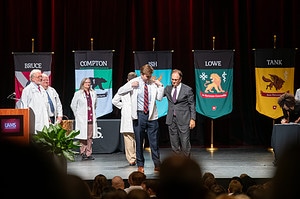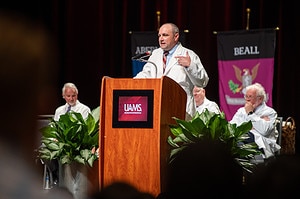View Larger Image

Incoming medical students, known as the Class of 2027, recite the medical student oath, as led by James Graham, M.D., before donning their white coats on stage.
Image by Bryan Clifton
College of Medicine Class of 2027 Takes Medical Student Oath, Dons White Coats
| The University of Arkansas for Medical Sciences (UAMS) welcomed 175 incoming students to the College of Medicine during an Aug. 4 ceremony at the Robinson Center Performance Hall in downtown Little Rock.
Collectively known as the Class of 2027, the 155 incoming first-year medical students at the main campus in Little Rock and the 20 at the Northwest Regional Campus in Fayetteville represent just 7.3% of nearly 2,500 applicants. The Fayetteville students participated virtually in the ceremony from Butterfield Trail Village.

The members of the Class of 2027 on the Fayetteville campus participated in a simultaneous white coat ceremony.
In a videotaped message greeting the new physicians-in-training, Cam Patterson, M.D., MBA, UAMS chancellor and CEO of UAMS Health, said the white coats each of them would don during the ceremony represent science, professionalism and cleanliness, and “show the investment in you by this institution.”
“Since 1879, when what is now UAMS opened its doors, we have educated almost 11,000 physicians, and the institution has educated the majority of Arkansas’ doctors,” said G. Richard Smith, M.D, a distinguished professor of psychiatry who is interim dean of the college and interim executive vice chancellor of UAMS. “But our goal is not only to impart the knowledge and skills a physician needs. We also work very hard to instill the highest professional and ethical standards. Tonight’s ceremony marks the beginning of that crucial component of your journey to becoming a physician.”

Richard Smith, M.D., watches from the left as students walk in front of flags representing the College of Medicine’s academic houses to be helped into their white coats by family members and advisers.Bryan Clifton
Keynote speaker Matthew Spond, M.D., an associate professor in the UAMS Department of Anesthesiology, was introduced by Sara Tariq, M.D., associate dean for student affairs, as a former student of hers “who embodies all of the qualities we strive for in a physician” and is a “fierce advocate for students.”
He told the class, “It doesn’t matter what your background is. Whether you have family members who are physicians or you are the first in your family to graduate college, know that you have earned your spot.”
Spond said that when he was in their position 19 years ago, he had recently taken “a hard 90-degree turn on the gravel road” and switched his career focus from structural engineering, in which he was pursing his Ph.D., to medical school.
He said he pursued a medical degree despite having “zero interest” in biological science while in college and initially being intimidated by classmates who were proficient in it.
The keys to academic success in medical school, he said, are the same as in other endeavors: hard work, dedication, perseverance and avoiding procrastination.
“Believe in yourself,” Spond told the group. “You’ve all got the academic machinery to get this done, though that doesn’t mean it’s necessarily going to be easy.”
Later, Tariq told the class, “It is now time for you to publicly commit to the principles of integrity and professionalism contained in our medical student oath.”
As the students rose from their seats, James Graham, M.D., executive associate dean for academic affairs for the College of Medicine, led them in the recitation of the oath, which he described as a prelude to “that day in May of 2027 when we will have a ceremony somewhat similar to this, called honors convocation, in which you will take the famous, centuries-old Hippocratic oath — that promise that physicians have made to their patients for hundreds of years.”
The medical student oath, he said, denotes a public promise to begin their obligation to their current and future patients.
In both Little Rock and Fayetteville, students moved toward the stage in groups according to their academic houses. Faculty advisers assigned to each house will shepherd them through their transformation into physicians.
Each student then walked across the stage when their name was called, where they were helped into a short white coat by their faculty adviser and/or members of their family. The short white coat will be replaced with a longer white coat upon earning a medical degree.

